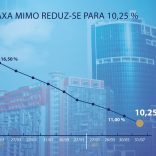President Chapo holds meeting with Mitsui CEO
Attorney-general to investigate undeclared debt

The Attorney-General’s Office announced on Thursday that it is to hire national and international experts to analyse debts incurred by the previous government.
It is estimated that between 2013 and 2014 the Mozambican government guaranteed loans valued at 1.4 billion US dollars without disclosing them to the country’s parliament, the Assembly of the Republic.
Almost all of this relates to bonds taken out on the international market by two quasi-public companies: Proindicus and Mozambique Asset Management (MAM). A further loan to the tuna fishing company Ematum was known about but is still subject to scrutiny by the Attorney-General’s Office.
The intention to bring in experts was revealed in Maputo by the Assistant Attorney-General, Taibo Mucobora, who was speaking to journalists on the sidelines of a seminar that is being jointly held by the Attorney-General’s Office and the Mozambican Doctors’ Order (OrMM).
Mucobora stated, “the Attorney-General’s Office will request the appointment of national and international experts with profound expertise in these issues so that we can obtain relevant and reliable information”.
He added that “after consultation with the managers of the three companies, the Attorney-General’s Office found violations of the budget law, regarding the failure to observe the limits and non-compliance with legal procedures, which implies criminal offences in the form of abuse of office or position”.
The limits that he referred to are the limits on government guarantees for loans. Those limits were the equivalent of 6.2 million dollars in the 2013 budget law and of 515 million dollars in the 2014 budget law. The guarantees for the loans were, therefore, hundreds of millions of dollars above the maximum permissible.
The Assistant Attorney-General explained that the collection of information will involve a large amount of work and requires specific knowledge in the areas of accounting and auditing.
He added, “this will necessitate international cooperation because we will need to go abroad to gather the information. We need to identify the experts and the countries involved as this encompasses a huge amount of money and many people and countries”.
The debt was incurred by the previous government, led by then President Armando Guebuza. However, it was not disclosed to either parliament or the international donors that cover a large part of government expenditure.
As a result of the revelation of the secret debt in April, the group of 14 donors known as the Programme Aid Partners (also known as G14) and the International Monetary Fund decided to suspend support for the state budget.
The debt has been partly responsible for the current economic crisis and a lack of foreign currency. However, other negative factors include the drastic fall in the price of some of the country’s export commodities (coal and titanium in particular), the severe drought which has hit the south and centre of the country, and attacks by armed elements belonging to the opposition party Renamo in parts of the centre of the country. In addition, the huge investment expected for the development of the gas industry has so far failed to materialise due to the fall in the price of oil and gas.
Overall, this has led to the national currency falling in value from 30 meticais per dollar at the beginning of 2014 to over 65 meticais per dollar today. The annual rate of inflation is currently 19.72 per cent and there is pressure on the government from bakers to allow an increase in the price of bread.













Leave a Reply
Be the First to Comment!
You must be logged in to post a comment.
You must be logged in to post a comment.